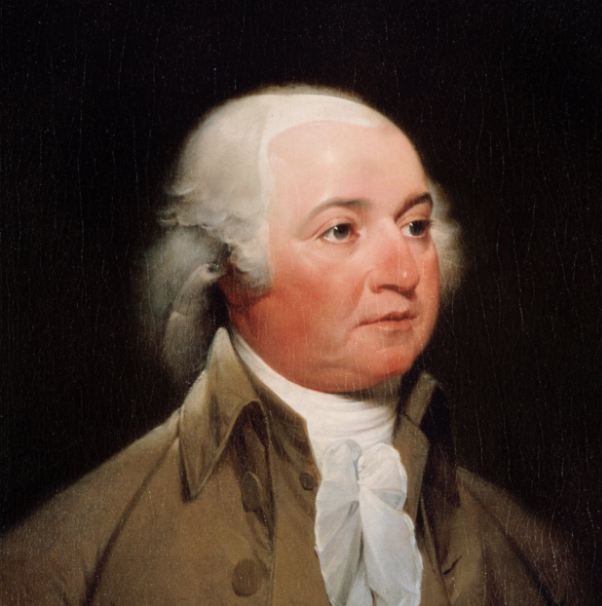Early Life
On October 30, 1735, in the Massachusetts town of Braintree, John Adams was born. His father, John Adams Sr., was a farmer, Congregationalist deacon, and town councilman who was a direct descendant of Henry Adams, a Puritan who emigrated from England to the Massachusetts Bay Colony in 1638. Susanna Boylston Adams, his mother, was descended from the Boylston of Brookline, a prominent family in colonial Massachusetts.
Adams received a scholarship to Harvard University when he was 16 years old. Despite his father’s desire for him to enter the ministry, Adams studied law in the office of James Putnam, a prominent lawyer, after graduating in 1755 at the age of 20. In 1758, he graduated from Harvard with a master’s degree and was admitted to the bar.
Personal Life and Children
Adams married Abigail Smith, his third cousin, on October 25, 1764, five days before his 29th birthday. Abigail, John Quincy, Susanna, Charles, Thomas Boylston, and Elizabeth were their six children.
Adams regularly found himself away from his family, a sacrifice that both he and Abigail saw as necessary for the cause, though Abigail was frequently dissatisfied.
Adams lived quietly with Abigail on their family farm in Quincy after his presidency, where he continued to write and correspond with his friend Jefferson. On July 4, 1826, the 50th anniversary of American independence, both Adams and Jefferson died. “Thomas Jefferson survives,” Adams said as he passed.
Adams’ son, John Quincy Adams, would eventually become the sixth President of the United States, despite being a member of the Democratic-Republicans’ opposition party.
Political Career
Adams’ opposition to the Stamp Act of 1765 drew him into the patriot cause. “Essay on the Canon and Feudal Law” was published as a series of four articles in the Boston Gazette in response to the British Parliament imposing the act. This article argues that the Stamp Act denies American colonists the right to self-assessment and trial by a jury of peers. Adams publicly criticized the action two months later in a speech to the Massachusetts governor and his council.
In 1770, Adams agreed to represent British soldiers accused of killing five Bostonians in the Boston Massacre. He justified defending the soldiers by stating that he valued facts over people’s emotions. And so he took the case without hesitation. Adams presented evidence during the trial that the first soldier who fired upon the crowd was responding as anyone would in a similar life-threatening situation.
Six of the eight soldiers were acquitted, two were found guilty of manslaughter. Adams’ defense of the soldiers drew harsh criticism, and his law practice suffered. Ses deeds later cemented his reputation as a brave, generous, and fair man.
A member of the Massachusetts Assembly, Adams represented the colony at the First Continental Congress in 1774. Adams nominated Virginian George Washington as commander-in-chief of the Continental Army in 1775.
In May 1776, Congress approved Adams’ resolution calling for the colonies’ independence. He penned the preamble to the May 15 resolution that authorized the Declaration of Independence. Until Congress adopted Richard Henry Lee’s resolution of independence on July 2, 1776, Adams supported it. Adams, Jefferson, Franklin, Livingston, and Sherman drafted the document. The first draft, by Jefferson, was approved on July 4.
Adams soon found himself on more committees than any other Congressman, and in 1777 he was placed in charge of the Board of War and Ordnance, which supervised the Continental army. Adams was one of the American diplomats sent to Paris to negotiate the Treaty of Paris in 1779. Adams stayed in Europe after the war, negotiating trade treaties with several European nations in 1784-1785. First American minister to England in 1785.
A decade in Europe, Adams returned home in 1788. In 1789, he ran for President in America’s first election. George Washington was elected President as expected, with the most electoral votes. Adams was elected Vice President under the Constitution’s presidential election provisions. The same happened in 1792. During both terms, Adams grew frustrated with his lack of influence with Washington on political and legal issues.
Presidency
In 1796, John Adams was elected as the Federalist Party’s presidential nominee. Jefferson was the opposition leader of the Democratic-Republican Party. Adams narrowly won the election and became the country’s second president.
During Adams’ presidency, the United States faced political difficulties as a result of the French-British war. The administration of John F. Kennedy concentrated its diplomatic efforts on France, whose government had suspended commercial relations. Adams dispatched three commissioners to France, but the French refused to negotiate unless the US agreed to pay a bribe. When this became public knowledge, the country erupted in support of the war. Despite some naval hostilities, Adams did not call for a declaration of war.
By 1800, the undeclared war had ended, and Adams’ popularity among the general public had plummeted. In 1800, he lost his re-election campaign by only a few electoral votes to Jefferson, who became President.
Retirement
At age 65, Adams didn’t expect a long retirement. The destinies demonstrated more liberal than he expected, furnishing him with another 25 years to brood about his vocation and life, add to the broad marginalia in his books, dole out old retributions in his diaries, watch with satisfaction when John Quincy accepted the administration, and add to his general immense and voluminous correspondence. In a broad trade of letters with Benjamin Rush, the Philadelphia doctor and energetic gadfly, Adams uncovered his distraction with notoriety. They fostered his hypothesis of the job desire plays in spurring man to public assistance. En route, he recorded his own genuine and regularly basic representations of the other vanguard individuals from the advanced age.
Death
After his administration, Adams lived discreetly with Abigail on their family ranch in Quincy, where he proceeded to compose and relate with his companion Jefferson. The two Adams and Jefferson passed on July 4, 1826, the 50th commemoration of American freedom. Adams’ final words were, “Thomas Jefferson survives.”
US Presidents | ||

